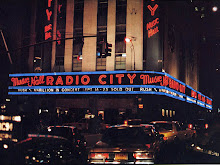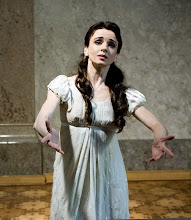 When it comes to reviews, I typically take it upon myself to spit out some rhetoric on what I like or dislike about this and that.
When it comes to reviews, I typically take it upon myself to spit out some rhetoric on what I like or dislike about this and that. Not this time.
Noodling through Amazon.com and the R.E.M. reissues on Warner Bros., I decided to see what some folks had to say about Automatic for the People, their early 90s classic.
All I can say is that there's no way I could ever dream of topping the assessment this reviewer gives the album. He/she points out things in the songs I would have never considered... some rather impressive insights. Knowing this recording pretty well, the assessments are dead on.
If you've never heard this album, it's worth every penny. ESSENTIAL for any rock collection.
S
A Guided Tour of the Soul,
| By | Biker395 (Torrance, CA USA) - See all my reviews |
This review is from: Automatic for the People (Audio CD)
AFTP is easily one of the best CDs of the `90s."Drive" sets the tone for the album. It sounds much like a funeral march. From the first five notes, it's direction is clear: dark, moody, and foreboding ... you know the this is no ordinary CD ... there are no "shining happy people" here ...
AFTP begins by tackling the decision to live or die. "Try Not to Breathe" is about deciding to die. It presents the thoughts of an old man who has lived a full life and has decided that he is ready to go. He muses what the world will be like without him and how he'll be remembered when he's gone.
"Everybody Hurts" is about deciding to live. The case is made that hurting is a necessary and temporary part of life ... it's not a reason to give up. Nor do we hurt alone. The lyrics and melody are nakedly simple and direct.
"Sweetness Follows" is about the healing and perspective that the death of a loved one can sometimes bring. The image is of the death of a loved one who was made more distant by a preoccupation with the banal, everyday concerns of life. Their death is a wake up call to forget the little things and recognize the power of the relationships with those we love.
"Man on the Moon" is probably the best known of the songs on AFTP. It wonders aloud ... what is it like in heaven? The human beings of the ages (Moses, Newton, and Darwin) are used to evoke a sense of an infinite hereafter. One wonders, what does someone like Andy Kaufman do in heaven amidst the likes of Moses? Well, Andy Kaufman is there, still "goofing on" Elvis, still wrestling, and still having breakfast with Mr. Blassie. Maybe it's not such a serious place after all.
"Nightswimming" is a bullet through the heart. I've heard it described as a song about nostalgia, but I think it's much more than that. It's a regretful look at a path not taken viewed from the wisdom obtained from the passage of time. The image is of someone driving alone at night wistfully looking at the image on a precious old photograph sitting on the dashboard. Swimming at night is a metaphor for the memory of a moment at the crossroads, facing a choice that involved playing it safe, or taking a personal, reckless risk of exposure.
The picture, like the memory it represents, is turned away ... as if it's painful to see But just like the picture on the windshield, turned around for all to see, the memory is worn like a badge:
"The photograph on the dashboard, taken years ago, turned around backwards so the windshield shows."
The haunting image comes and goes with each passing streetlight. Although the image is seen backwards, the hindsight made possible by the passing of time reveals a significance of the moment that was not fully understood at time:
"Every streetlight reveals the picture in reverse. Still, it's so much clearer."
With the passage of time, the fears (and the vitality that go with them) are gone and replaced by the tedium of everyday life ...
"These things they go away, replaced by every day"
... but the longing remains, and now with profound regret. He's left with a bittersweet memory of what was and the fantasy of what might have been:
"Nightswimming, remembering that night. September's coming soon. I'm pining for the moon. And what if there were two; side by side in orbit around the fairest sun? That bright, tight forever drum could not describe nightswimming."
"The photograph reflects, every streetlight a reminder. Nightswimming deserves a quiet night."
All of these achingly personal lyrics are accompanied with the stark loneliness of Stipe's voice and a wonderfully sad but sweet piano melody. "Nightswimming" is the brightest star in an album full of celestial wonders.
Nightswimming is a tough act to follow, but "Find the River" pulls that off nicely. It uses a flowing river as a metaphor for the passing of life. The image is one of a solitary soul floating down a river watching his life pass before his eyes, throwing aromatic fruit and spices as if he was sowing seeds. The river flows toward its inexorable but natural end at the ocean, just as life flows toward inevitable death.
"The river to the ocean goes, a fortune for the undertow. None of this is going my way. There is nothing left to throw of Ginger, lemon, indigo, coriander stem and rose of hay. Strength and courage overrides the privileged and weary eyes of river poet search naivete. Pick up here and chase the ride. The river empties to the tide. All of this is coming your way."
The repeated use of the phrase "nothing is going my way" is a reminder that the journey of life, especially at the end, is one that everyone takes alone.
A final brilliant aspect of "Find the River" is the way that it ends. Unexpectedly ... almost suddenly ... with a lot of loose ends untied. Just like life.
If you're looking for happy melodies and easy to digest lyrics, look elsewhere ... AFTP is not for you. But if you're looking for a companion on a guided tour of your soul, this is it. There are good reasons why so many people think AFTP is one of the best CDs of the 90s. It is.






















No comments:
Post a Comment